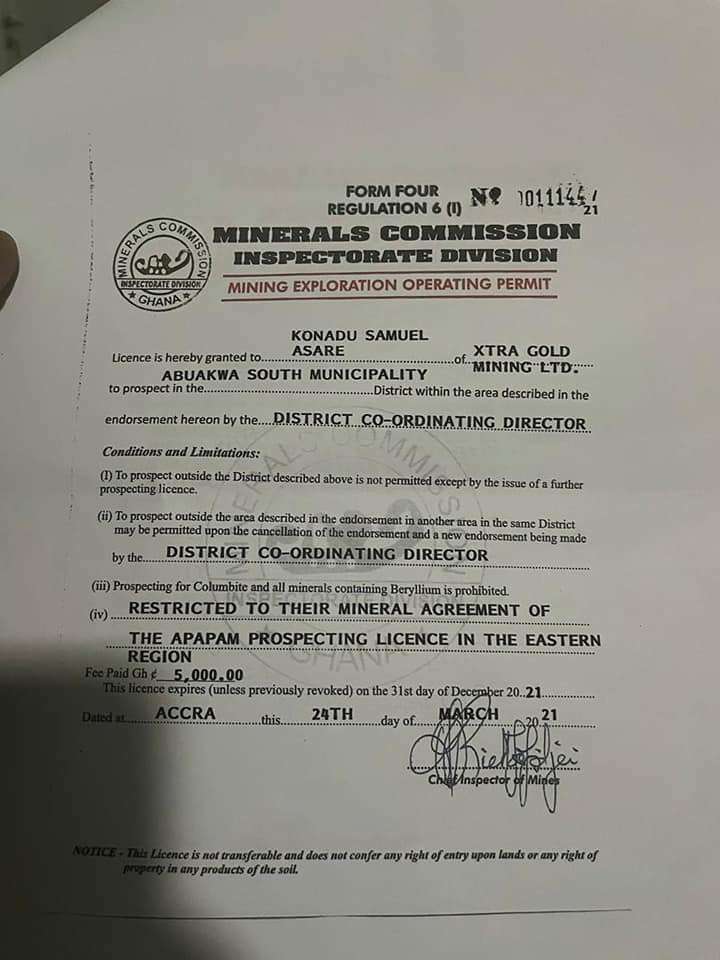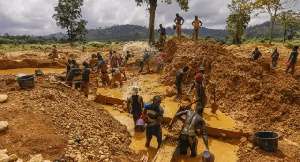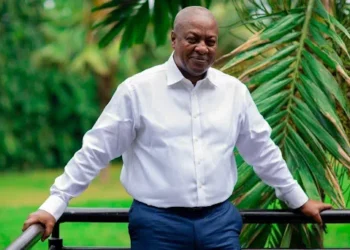Illegal gold mining in Ghana has sparked significant anxiety, derailing the messaging of major political parties just weeks before the presidential elections.
Protests and strikes have emerged in response to the environmental and regulatory failures surrounding gold mining.
Ghana’s rise to the top of Africa’s gold production charts, particularly overtaking South Africa in 2018, is rooted in a lax regulatory framework that facilitated a gold boom. Despite a government-imposed ban on small-scale mining from 2017 to 2018, production soared, highlighting severe discrepancies between official policies and on-ground realities.
Political accusations regarding the rapid issuance of mining licenses have intensified, with the opposition blaming the ruling party for environmental degradation.
The Minerals Commission, the primary regulator, has been criticized for issuing conflicting data to different bodies, raising concerns about transparency and corruption.

For instance, data submitted to the Global Environment Facility on mining licenses differ from those shared with Ghana’s own Extractive Industries Transparency Initiative (GHEITI).
Further investigations reveal a staggering amount of land allocated for small-scale mining during the supposed ban. As calls grow for the next government to re-examine the country’s mining licenses, Ghana’s political economy of mining is in a precarious state, requiring a rigorous overhaul of regulatory institutions.
Ghana’s rapid rise as Africa’s top gold producer has come with a hefty price: environmental degradation, regulatory gaps, and social unrest.
The Faustian bargain of neglecting robust institutional oversight in favor of short-term economic gains has now left the country grappling with significant consequences. With small-scale mining accounting for over 40% of production despite bans, inconsistencies between official data and reality point to a larger governance crisis.
In a discussion with a Policy Analyst and Senior Lecturer in the Department of Political Science at the University of Ghana, Dr. Joshua Jebuntie Zaato, decried controversies surrounding mining data licenses of small-scale mining sector in Ghana.
Meanwhile, this sector has faced significant scrutiny due to environmental concerns, regulatory gaps, and discrepancies in mining data. The conversation highlighted the government’s attempts to balance economic interests with sustainable practices.

The Role of the Minerals Commission
Dr. Zaato emphasized the Minerals Commission’s critical function in issuing mining licenses.
“The Minerals Commission derives its power from legislative instruments (LI) that authorize it to give licenses for mining.”
Dr. Joshua Jebuntie Zaato Policy Analyst and Senior Lecturer University of Ghana
He pointed out that the relationship between the number of licenses issued and gold production is directly proportional.
“The more licenses you give, the more people you give permission to go and [mined], there would be a correlation or infact a causality between that and the amont of gold, [leading to an increase in the quantity mined].”
Dr. Joshua Jebuntie Zaato Polity Analyst and Senior Lecturer University of Ghana
However, this rise in production has not come without consequences. The government has previously imposed bans on small-scale mining, most notably in 2017 and 2018, to combat illegal mining activities known as “galamsey.” Yet, despite these bans, Ghana managed to produce 4.8 million ounces of gold in 2018, a figure that raises questions about the effectiveness of regulatory measures.
A key concern raised in the discussion was the discrepancies between the data reported by the Minerals Commission and that from other bodies, such as the Ghana Chamber of Mines. He reiterated; If the Minerals Commission says it issued 1,000 licenses, it does not mean all are active. Some may be dormant or revoked.
This suggested a deeper issue of Mining data management and transparency within the sector. However, the inconsistency in figures can lead to mistrust in the regulatory framework, complicating efforts to manage small-scale mining effectively.
Environmental Impacts and Sustainable Practices
One of the most pressing challenges facing Ghana’s mining sector is the environmental degradation caused by small-scale mining.
“It’s true that most of them are not obviously adopting environmental frienddly measures, [and] that is why the pollution is [coming].”
Dr. Joshua Jebuntie Zaato Policy Analyst and Senior Lecturer University of Ghana
Dr. Zaato emphasized that the government of Ghana is putting measures to implement stricter regulations and enforce compliance including cautioning from mining near water bodies, avoidance of surface ming, and revoking all/certain licenses, including the LI in areas deemed necessary.
”I don’t know who’s responsible for enforcing the responsible mining, probably the EPA. So in this case, that means [there’ll probably be a different body] that issues the license and then another different body that has to regulate. So now when that happens, it creates some policy confusion.”
Dr. Joshua Jebuntie Zaato Policy Analyst and Senior Lecturer University of Ghana

Balancing Economic Interests and Environmental Protection
Dr. Zaato recognized the difficulty of balancing economic interests with environmental protection.
”[ For instance] in Canada, most of the oil is mixed with sand. So it means that you literally have to take the sand, then put it through a little process to extract the oil. So you can imagine, it destroys the environment. … you can Google, you can search for it.
Canadian sands oil is one of the biggest protesters. So if you go to Canada right now, especially in Alberta, other places, they are environmentalists who have serious problems with the government on how it extract oil. But the government said, look, Oil is a big major issue.
So all over the world, these issues do exist. Finding a smart and intelligent way to on the one hand, extract the natural, resources, whilst on the other hand, not polluting or destroying the environment. I think it’s the, [magical blood] that everybody is looking for, it can be done, and it should be done.”
Dr. Joshua Jebuntie Zaato Policy Analyst and Senior Lecturer University of Ghana
This perspective underscored the need for a multi-faceted approach to sustainable mining practices.
The Need for Political Consensus
He argued that without collective action among political parties, effective solutions would remain elusive. ”This is a time when we need national consensus more than ever” he stated.
”The national consensus needed is difficult, and I’m afraid that you cannot get that consensus in our election year. Because what simply happens is that one party thinks [it will] be an advantage for me and a disadvantage for the other.”
Dr. Joshua Jebuntie Zaato Policy Analyst and Senior Lecturer University of Ghana
He warned that the electoral cycle complicates this issue, as political parties often prioritize short-term gains over long-term solutions.
He emphasized that; In an election year, the temptation to exploit mining issues for political advantage can hinder necessary reforms.
Dr. Zaato’s insights shed light on the intricate dynamics of small-scale mining in Ghana. As the country grapples with environmental concerns and regulatory challenges, the need for effective governance and sustainable practices becomes increasingly urgent.
Dr. Joshua Jebuntie Zaato’s highlights underscored the importance of collaboration among various stakeholders, including government bodies, mining companies, and local communities, to ensure that Ghana’s rich mineral resources are managed responsibly and equitably.
READ ALSO; Arnold Baidoo Criticizes Election Prophecies





















